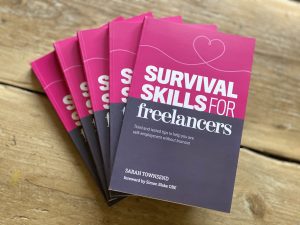I always thought legendary Cotswolds copywriter and editor Sarah Townsend wrote the book on freelancing. But now she’s actually gone and done it. It’s even been released on National Freelancers’ Day. Let’s turn some pages.
 So your shiny new book, Survival Skills for Freelancers, is out today. How excited are you?
So your shiny new book, Survival Skills for Freelancers, is out today. How excited are you?
Oh, you can’t imagine. It’s like a milestone birthday and Christmas all rolled into one. Everything has been leading up to this day for so long, and I can’t wait to see how well Survival Skills for Freelancers performs out there in the real world! Can’t say I’m quite as excited about the inevitable adrenaline crash that will follow, but hey – it’s all good!
Did you always plan for publication on National Freelancers’ Day?
I did. There are five million self-employed workers in the UK right now, and over two million of them are freelancers. That’s a lot of us going it alone with very little support. I needed a publication date to focus on, and National Freelancers’ Day seemed like the perfect date.
What inspired you to write it?
Last year I wrote a blog sharing the things I’d learned from 20 years of freelance life. It proved to be by far my most popular post, and generated an overwhelmingly positive response.
People loved the honest, no-frills advice, combined with the heart-on-your-sleeve confessions. I realised I could use my experience to create an indispensable guide to the highs and lows of self-employment. A book that 29-year-old me would have loved at the start of my own freelance journey.
 Does it deal with freelancing in general or is there a bias towards copywriting and editing? Is it as useful for, say, a freelance web designer as it is for a copywriter?
Does it deal with freelancing in general or is there a bias towards copywriting and editing? Is it as useful for, say, a freelance web designer as it is for a copywriter?
It’s very much aimed at freelancers in general. While the anecdotes and stories relate to my experiences as a freelance copywriter, the advice is relevant to anyone who’s already self-employed, or who’s thinking of going solo.
What else can we expect?
It provides advice on the issues we all experience as freelancers, such as:
- Strategies to deal with isolation
- Knowing your worth – and what to charge
- Trusting your instinct, and learning to say no
- Achieving balance and avoiding burnout
- The importance of investing in your business
- The qualities that help you survive and thrive as a freelancer.
It’s a crowded market. What do you think makes your book different?
Think of all the books you’ve ever read on copywriting. Do you ever say to yourself, “I enjoyed Copywriting ABC, but it was just like Copywriting 123!”? I doubt it. That’s because no two journeys, no two voices, and no two approaches are the same. So yes, there are other books on freelance life out there, but none quite like this one.
I didn’t want Survival Skills for Freelancers to feel like a conventional business book. Yes, it’s packed full of tried-and-tested strategies and practical advice, but it’s more than that. I wanted it to feel collaborative and supportive – like I was there on the journey with you.
Fellow copywriter Anna Gunning sums it up as being, ‘like having your own personal business mentor’, while my first ever Amazon review said, ‘Reading this book was like settling down with a good friend for a business chat’. I actually teared up when I read it because that’s exactly how I wanted it to feel.
How long did it take to write? And how many hours per day?
I had the idea at the end of last year and I’m publishing in mid-June, so I guess it took about eight months from start to finish.
I know people who’ve spent years conceiving, writing and publishing their books but that wouldn’t have worked for me. The only way I know how to do something is full on, 100 miles an hour. I’ve lived and breathed the book, the publishing process and the marketing for the past four months – possibly longer.
It’s ironic that it’s about balance and boundaries, because – particularly in the past couple of months – mine have gone out of the window. Yes, having a deadline has kept me laser focused, but I’ve found myself so engrossed in – and energised by – the writing, editing and sheer learning involved that I may, occasionally, have forgotten to look after myself. I imagine I haven’t been that easy to live with recently!
Did you have to put your day job on hold?
I set myself the goal of getting the first draft written by the end of January, and I gave myself a month off client work so that I could get it done. So yes, I did. For the past few months, and throughout lockdown, I’ve been juggling client work and book work. That’s been tough. Really tough. But I am SO happy with the end result that the long days have been worth it.
What did the writing process look like?
Actually, much the same as any copywriting job, but on a far grander scale. I’m (generally) hyper organised, and I think you have to be to make a success of this process. I started with thoughts, ideas, and a structure. I wrote, I edited, I revised the aforementioned structure… rinse and repeat. It’s like any writing job, I think. You start with all the elements and gradually fit them together in the right order, like a giant jigsaw puzzle.
Was there much research involved or was it all stored in your head?
It was a pretty good balance of stuff I needed to research and stuff I knew inside out. It’s very much written from the perspective of my own experience, so that bit was easy!
Copywriters are a friendly bunch. Did you get much help from the community?
They really are. Without the support of the freelance community, Survival Skills for Freelancers would be a very different book! Each chapter ends with quotes and opinions from freelancers on everything from impostor syndrome and what to charge to the importance of connection and when to say no. It also includes mini case studies from copywriting legends such as Nick Parker and Graeme Piper.
Many of my copywriter friends are helping me to spread the word about the book because they believe in the importance of what I’m trying to achieve. They’ve been sharing pics of the book and reminders of the launch date all week. They’re amazing! So supportive.
What made you go down the self-publishing route?
I knew exactly what I wanted the book to look and feel like, and exactly how I wanted it to be structured. I would have struggled with not having complete control over cover design and content, so I knew from day one that I would self-publish!
What effect would you like the book to have?
I’d like it to help people get more enjoyment from self-employment. There’s a lot to love about freelance life, but it can be tough, too! I’ve been through a lot in my 20 years as a freelancer. I’ve done things that worked, and things that didn’t, and it took me a long time to get to a point where I felt like my own success was sustainable. Readers can use what I’ve learned to fast-track their own freelance success and make fewer costly, time-consuming mistakes in the process.
What advice would you give any other aspiring authors?
Acknowledge that it’ll take a LOT of time – and that there’s a lot more to the process than just being able to write. Within a month of getting started I had an A4 folder that was two inches thick with information: print quotes, freelancer quotes, research, resources, useful articles, marketing tips… And I have over 400 documents in the Survival Skills for Freelancers folder on my Mac!
If you’re planning on self-publishing, be prepared to do your research – there’s heaps of information out there – and don’t be afraid to ask colleagues who’ve been through the process for advice.
Brilliant. Finally, how can we get hold of a copy?
Survival Skills for Freelancers is available from Amazon in paperback and Kindle formats, and there’s more information at survivalskillsforfreelancers.com. I’m all set to record the audiobook, too – just need to find the time to do it!
